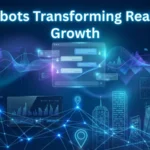Manufacturing is an industry that involves the most repetitive and tedious tasks. Something that artificial intelligence promises to automate. While the industry has already been using AI for some of its tasks, the introduction of Generative AI seems to be a revolution in the sector. Any manufacturing brand needs to consider how artificial intelligence can transform their sector positively. To stay competent in a field, it is necessary to understand, implement, and evolve with the latest technologies. So, let us see how AI can help in this industry and the future of AI in manufacturing.
Generative AI in Industrial Automation
Generative AI is one of the best gifts of advanced technology to mankind. Unlike traditional models of artificial intelligence, generative AI can create original content. This unique feature of generative AI helps in getting several things done that would take human efficiency and time otherwise. AI in manufacturing serves several automation, creative, and innovative purposes. Let us go through the use cases or applications of generative AI in this sector.
Application of AI in Manufacturing

Due to its generative properties and understanding of patterns, artificial intelligence is rapidly changing the way manufacturing industries work. From innovation to error detection and automation of repetitive tasks, a majority of processes in the industry can be streamlined with artificial intelligence. Here are some of the roles AI can play in manufacturing industries:
Generative Design
The first and already established use of artificial intelligence is in the design process. Many automotive and aerospace designs have been created by artificial intelligence. AI creates designs based on the preferences and resources within minutes to provide an early idea of iterations to the designers. It has been observed that AI generates better designs that are both cost-effective and functional in a couple of days.
Digital Twin Technology
Digital twin technology is when AI is used to create a virtual replica of processes, supply chains, and factories, etc. This allows real-time analysis of the process or factories, allowing timely performance insights or improvement opportunities. Creating a digital twin allows manufacturers to optimize and observe a process without being physically present at the site. These digital twins depend on IoT sensors, PLCs, deep learning, and AI algorithms. These technologies continuously update the digital counterpart with the actual process, offering real-time and accurate details.
Predictive Analysis and Maintenance
Artificial Intelligence models are trained on a large amount of datasets, allowing them to understand patterns. Such well-trained AI platforms can predict any incoming issues or errors depending on the pattern study. Apart from the textual data, computer vision optimization also helps see minor irregularities in the product and thus discards any defective product early. AI forecasts defects before they occur, even in digital twin machinery. Therefore, it saves the trouble of major repairs later by allowing early detection and optimal fixes.
Custom Manufacturing
Integrating AI in manufacturing helps deliver to customers custom products by automating the mass customization process. Artificial Intelligence quickly makes changes in the design process and allows the customizations to take place without delaying production time.
Cobots
Cobots are collaborative robots that can work alongside humans to increase productivity and safety. Cobots bridge the gap between human efficiency and machine precision. They take care of dangerous as well as repetitive tasks in the processes. Powered by generative AI, they are safe to integrate around humans.
Supply Chain Optimization
Artificial Intelligence optimizes supply chain by predicting demands, streamlining logistics, and managing inventory through vast dataset analysis. When AI is paired with a digital twin, it creates a virtual version of the entire supply chain. This helps manufacturers monitor closely the irregularities or disruptions in the supply chain in real time.
Inventory Management
AI can predict stock needs and automate inventory replenishment. By allowing manufacturers to monitor inventory levels, stock demands, and other patterns, artificial intelligence helps maintain appropriate stock levels and improve cash flow. This intelligently optimized inventory management system allows manufacturers to stock up on items in demand and not overstock any item based on real-time data.
Energy Management
All manufacturers and governments are focusing on energy-efficient processes and guidelines. Sustainability is the need of the hour, and artificial intelligence can help achieve it. AI in manufacturing can monitor the use of energy, any overconsumption or energy deficiency in process chains, and help optimize the efficient use of energy in the factories. This saves energy consumption and promotes sustainability in the organization.
Other Adjacent Processes
Although not directly linked to manufacturing processes, artificial intelligence can help optimize marketing, sales & order, workforce management, and maintenance. These processes are important to any business or industry. AI in manufacturing can be put to use in these processes as well.
Future of AI in Manufacturing
The future of AI in manufacturing is quite promising. Despite the fearmongering about AI taking over and other rumors, artificial intelligence has made a significant place in every industry. Technology continues to adapt, improve, and be more useful to mankind every day. With gradual improvements in its functioning, more and more companies are implementing AI somewhere in their operations. Several benefits predict the future of AI in manufacturing. These benefits include:
Increased Efficiency
All the applications of AI in manufacturing are quick and precise. Thus, the integration of artificial intelligence increases the efficiency of all the processes. Use of digital twins and cobots further adds efficiency and convenience to the system. Right from design to delivery, generative AI in industrial automation is the future.
Cost-reduction
By streamlining processes, early risk detection, and data analysis, the integration of AI in manufacturing leads to significant cost reduction. Artificial intelligence also reduces labor and maintenance costs. Therefore, the future of AI in manufacturing is cost reduction and time saving to a great extent.
Increased Safety
With the implementation of AI-powered cobots, many risky, dangerous, or tedious tasks can be assigned to them. This will allow humans to pay attention to other non-hazardous tasks. This improves safety at the workplace and also reduces labor costs.
Better Decision-Making
The use of predictive and data analysis features of AI allows stakeholders and manufacturers to make more informed decisions. Be it design improvements, inventory restock, or system failures, artificial intelligence provides early signs and thus facilitates better decision-making.
Sustainability
Artificial Intelligence closely observes the consumption of energy and resources in the organization. Through detailed insights and optimization, organizations can ensure sustainable practices and energy savings.
Implementing Generative AI Services
To harness the maximum benefits of AI in any industry, it is essential to employ a genuine service provider for the implementation. AnavClouds Analytics.ai is a reliable company for data and generative AI services. Our team of data scientists and AI experts analyzes and provides organizations with the right AI solutions to enhance their systems. We build and train AI to extract its maximum potential for the benefit of your organization. Our dedicated team makes sure to deploy the tool in your system smoothly and systematically. We also provide post-deployment improvements and changes as per requirement.
Conclusion
The era of artificial intelligence is revolutionising every industry. Manufacturing is one of the industries that it has and will be impacted in the future. The future of AI in manufacturing is an ocean of possibilities with industrial automation, increased efficiency, better safety, and sustainability. To remain competent with market trends and current customer base, the implementation of the latest technologies in your organization is necessary. Book a demo with AnavClouds Analytics.ai to understand the role of artificial intelligence in your organization. Explore the vast possibilities of your business with AnavClouds’ expert generative AI services.
FAQs
How is generative AI used in the manufacturing industry?
Generative AI automates data handling and search optimization by document sorting and summarization. It also helps with design and supply chain management in the manufacturing industry.
Which phase in manufacturing benefits from the design generation feature of AI?
The conceptual phase of manufacturing benefits from the generative design application of artificial intelligence.
How is AI used in production planning?
Artificial Intelligence helps in production planning by providing precise forecasts and resource allocation to manufacturers.
What is the future of AI in manufacturing?
The future of AI in manufacturing will provide increased efficiency, reduced costs, automation, and intelligence in processes.
What does Smart Manufacturing mean?
Smart Manufacturing refers to a modern approach to manufacturing processes with advanced technologies and methods. Smart manufacturing provides better results and improved overall efficiency.



